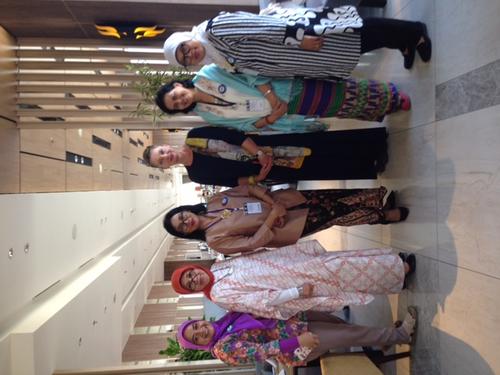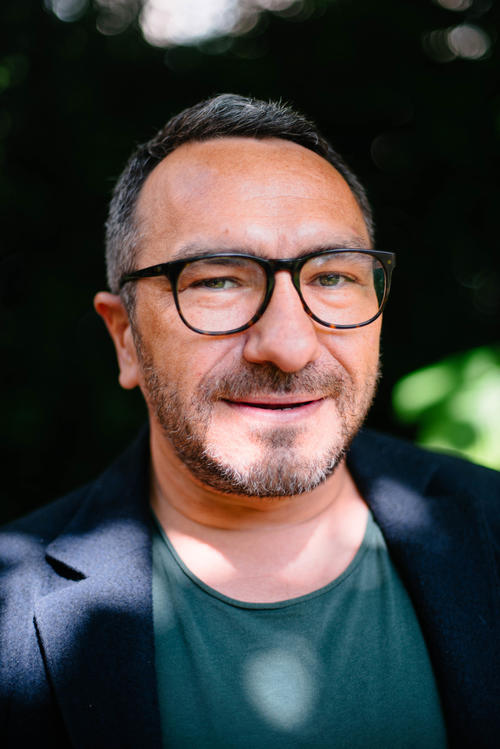Research collaboration at eye level: what the Global North can learn from the Global South
Claudia Derichs (3rd f.r.) with her colleagues from "Assosiasi Studi Gender dan Anak", an inter-university association for gender studies in Indonesia
Image Credit: Universitas Airlangga
The “co2libri” and “CritUP” projects explore the cooperation with partners from Latin America, Africa and Asia. Why do we know so little about the research theories of the global South? And how can we change this?
English is the lingua franca in science. At international conferences or in scientific articles, English is the norm for most researchers. Can this also apply, however, if non-academic activists or employees of NGOs are partners in a research project? Foreign language skills cannot be taken for granted in every case.
Language is a key – this applies even more so to collaborative research projects with partners from the so-called global South. Whether it’s the colonialism debate, societal changes or social movements – in humanities and social sciences, the theoretical foundations for considering the research topic usually comes from the global North, the USA or Europe. This is frequently the case because scientific debates or papers by scientists from Latin America, Africa or Asia are partly only available in the respective national languages. Their theories have consequently attracted significantly less attention to date.
The Berlin University Alliance (BUA) funds two research projects that take a self-critical look at the existing imbalance: “co²libri – Conceptual Collaboration: Living Borderless Research Interaction” and “CritUP – Critical Theory Under Pressure: Building Networks for Transnational Dialogue”, both projects are located at Humboldt-Universität and Freie Universität, and a further project partner is Leibniz-Zentrum Moderner Orient (ZMO). In each case, the central question is how the exchange of knowledge and collaboration can function better, and on equal footing. “Co²libri” and “CritUP” are funded by the Berlin Center for Global Engagement (BCGE) and were launched at the end of 2022/the beginning of 2023. BCGE is the BUA platform for research collaboration with the global South.
Robin Celikates, Professor of Social Philosophy and Anthropology at the FU Berlin
Image Credit: Marvin Ester
Robin Celikates sees this the same way. The philosopher is also dissatisfied with the asymmetry of the levels of knowledge. “In my research area, the critical theory of the Frankfurt School, which is also the starting point for CritUP, an extremely US and Europe-centred view has always prevailed.” For a long time, researchers from the global North were not even aware how intensely critical theory had been received and further developed in countries of the global South, for example in Latin America or in Asia. “When we meet these colleagues at conferences, they know our debates and publications very well. Unfortunately, this is frequently not the case vice versa. We must change that.”
South America, for example, has become a socioeconomic and political laboratory, “in which tendencies manifest that could increasingly also affect the global North. Think, for instance, of neoliberal austerity policy and authoritarian threats to academic freedom. Many scientists in countries of the global South have to confront this, for example in Brazil or Chile. Something similar also applies, of course, to other regions and countries – China, Iran or also Turkey.” CritUP project partners are researchers from Peru, Chile, Brazil and Turkey.
What Celikates observes, regarding the reception and further development of critical traditions of thought, also applies to other fields, such as the scientific study of Islam.
Islam Studies almost automatically involves the Near and Middle East, particularly the Arab countries, or also the Western view of Islam. Indonesia has produced its own school of thought in Islam Studies over the decades, but it is less well known. The Islam scientist Syafiq Hasyim, who teaches at the Indonesian International Islamic University in Jakarta, emphasises how important a variety of perspectives on Islam are. Hasyim is among the fellows Claudia Derichs invited to Humboldt-Universität as part of “co²libri”.
“Our university differs in the range that it offers and in its approach from Islamic universities, for example in Malaysia or Pakistan,” Hasyim explains. “We are a general university and offer all the common faculties. Above all, however, we take an interdisciplinary and application-oriented approach from the beginning.” This also means: “The university is open to students and teachers who are not Muslims.” It is precisely this diversity of perspetives that is fundamental to him and his colleagues, emphasises Hasyim, who spent several years in Berlin some time ago as a doctoral student.
Indonesian universities, with their application-oriented approach, differ from the often strongly academic view of research topics at German universities: “In Indonesia, we say: Universities must share their knowledge with society and be a part of it – the opposite of an ivory tower,” says Hasyim. The global North can learn from the global South here.
Claudia Derichs became familiar with an impressive empowerment project in Indonesia, far from any ivory tower: the interdisciplinary Center for Gender and Child Studies at Sataya Wacana Christian University in Salatiga accompanies an ecofeminist project in batik production. The workers are supported in using their self-produced natural dyes for the traditional cloth dyeing art instead of the chemical dyes that are harmful to health. “Marketing students were involved in this project as well as computer scientists and biochemists,” Derichs explains. “I hope we see more projects like this in Germany too.”
“co²libri” and “CritUP” are working on making exemplary projects like this from the global South better known. Both research projects are therefore a good example of a central goal of BUA: making science even more cooperative, inclusive, transparent and verifiable, together with politics, the economy and civil society.
The project managers are the regional scientist Claudia Derichs, professor of Transregional Southeast Asian Studies at Humboldt-Universität (together with Prof. Kai Kresse, ZMO/Freie Universität), and the philosopher Robin Celikates, professor of Practical Philosophy at Freie Universität (together with professor Rahel Jaeggi from Humboldt-Universität). They use the funds to invite fellows from countries of the global South for research stays in Berlin, to finance doctoral student places or to commission translations of scientific texts, among others.
They both agree that interpreters at conferences and translations of specialist articles are an important first step. “German, or rather European researchers, could also, for their part, use offers of language courses at their universities to acquire basic knowledge in, for example, Swahili or Indonesian or in another required language”, proposes Claudia Derichs additionally.
As the regional scientist emphasises: “With our projects, we do not wish to develop a theory for collaborative projects with the global South. Our aim is clearly practical concepts.”
This deficiency has long disturbed Derichs, who often spends time in Southeast Asia as a researcher: “The demand, repeated like a mantra in recent decades, to research together with actors of the global South and not just about them, has not yet led to satisfying concepts for a systematic approach.”
Changing this is her motivation for “co²libri”. The project partners are researchers from Pakistan, Palestine and the Philippines, among others. “Researchers in collaborative projects who focus on social movements or activism, for example”, Derichs says, “can begin by first exchanging views on the different interpretations of concepts, such as empowerment, and thereby completely put preconceived notions out of their heads, ideally. For there are, of course, various interpretations of empowerment.” In English, one speaks – very aptly – of “unlearning”.
Further Information
The projects (funding period three years, respectively):
“co²libri – Conceptual Collaboration: Living Borderless Research Interaction”, project management: Prof. Dr. Claudia Derichs (Humboldt-Universität) and Prof. Dr. Kai Kresse (ZMO/Freie Universität)
“CritUP – Critical Theory Under Pressure: Building Networks for Transnational Dialogue“, project management: Prof. Dr. Robin Celikates (Freie Universität) and Prof. Dr. Rahel Jaeggi (Humboldt-Universität).




